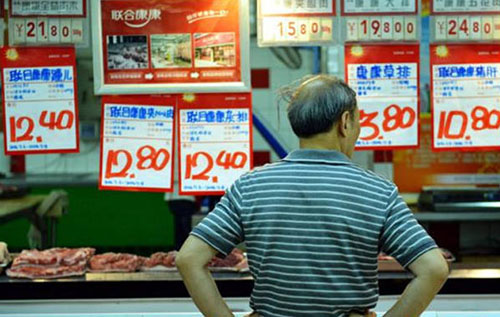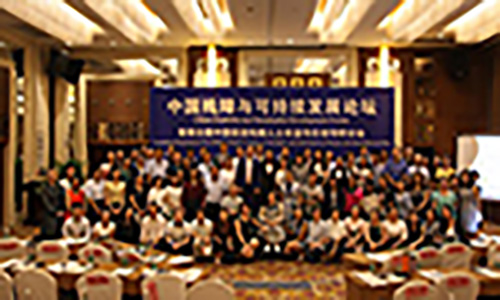


China's consumer inflation grew mildly in June, as stable prices reinforced the view that the world's second largest economy is firming up.
China's consumer price index (CPI), a main gauge of inflation, rose 1.5 percent year on year in June, the National Bureau of Statistics (NBS) said Monday.
The June expansion remained unchanged from May's reading, and increased from April's 1.2 percent and March's 0.9 percent. On a monthly basis, however, the CPI declined 0.2 percent, according to the bureau.
The NBS attributed the monthly decline in CPI to lower food prices, which dropped 1 percent month on month in June.
Fruit prices shed 4.2 percent month on month in June. Pork and vegetable prices fell 3.4 percent and 1.1 percent, respectively.
Year on year, food prices dropped 1.2 percent in June while non-food prices rose 2.2 percent.
Excluding volatile food and energy prices, the core CPI increased 2.2 percent year on year in June, compared with 2.1 percent in May.
The CPI increased 1.4 percent on average in the first half of the year.
Jiang Chao, chief economist at Haitong Securities, said the CPI may rise mildly in July, but on the whole inflation will hold steady.
Beijing-based investment bank CICC echoed this view in a research note, forecasting that inflation will remain tamed in the near term as food prices, especially the egg price, will remain stable.
The CPI figures came alongside the release of China's producer price index (PPI), which measures costs for goods at the factory gate.
The PPI rose 5.5 percent year on year in June, flat with the pace in May, marking the end of continued declines in PPI growth pace since February this year. In the first half of 2017, PPI averaged 6.6 percent, NBS data showed.
Factory-gate price inflation in the ferrous and non-ferrous metal smelting and rolling industries expanded year on year, while the price increases eased for the coal mining and dressing, petroleum processing, as well as petroleum and natural gas extraction industries, according to NBS senior statistician, Sheng Guoqing.
Month on month, PPI edged down 0.2 percent in June, narrowing from the 0.3-percent decline in May, NBS data showed.
The steady price data reinforced views about stabilization in the world's second-largest economy.
China has set its GDP growth target at around 6.5 percent for 2017, compared with a target range of 6.5 to 7 percent last year. It is aiming to keep the CPI increase at around 3 percent.
The official manufacturing PMI rose to 51.7 in June, accelerating from 51.2 in May, marking a three-month high, according to NBS data.
June's official non-manufacturing PMI also improved to 54.9, from 54.5 in May, evidence of a better economic structure. China has been trying to shift its economy toward a growth model that draws strength from consumption, services, and innovation.
Taming inflation leaves the central bank leeway to stay composed in raising interest rates. China's monetary policy in 2017 is set to be "prudent and neutral" to keep appropriate liquidity levels and avoid large injections.
The People's Bank of China reiterated last week that it would continue with the prudent and neutral monetary policy, use a range of monetary policy tools to maintain stable liquidity, and place more importance on the prevention and control of financial risk.
"We expect China's monetary policy to remain neutral," said the CICC report.
 Magnificent view of Nansha Islands in South China Sea
Magnificent view of Nansha Islands in South China Sea Aerial view shows scenery in Hong Kong
Aerial view shows scenery in Hong Kong China builds world’s first offshore fish farm
China builds world’s first offshore fish farm A Foreigner's Chinese Dream and Love for China
A Foreigner's Chinese Dream and Love for China 5,000-year-old Chinese beer recipe goes down a storm in US
5,000-year-old Chinese beer recipe goes down a storm in US World's first driverless rail transit system unveiled in Hunan
World's first driverless rail transit system unveiled in Hunan World's largest cluster of Miao villages in Guizhou
World's largest cluster of Miao villages in Guizhou Daily life in Kashgar, China's Xinjiang
Daily life in Kashgar, China's Xinjiang Top 10 Chinese tech and engineering marvels
Top 10 Chinese tech and engineering marvels Top 10 most sustainable cities in China
Top 10 most sustainable cities in China Top 10 European patent applicants in 2016
Top 10 European patent applicants in 2016 The power of 'She' in China
The power of 'She' in China Seven most beautiful art museums in China
Seven most beautiful art museums in China China-NK Q1 trade data must be read fairly
China-NK Q1 trade data must be read fairly Children with disabilities still struggle to access mainstream schools: experts
Children with disabilities still struggle to access mainstream schools: experts Gay fiction bears brunt of new regulations that espouse socialist values
Gay fiction bears brunt of new regulations that espouse socialist values Mobile gaming industry booming
Mobile gaming industry boomingDay|Week